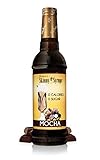
Have you ever wondered how to articulate the exquisite taste of the popular beverage known as mocha? Describing its richness and aromatic allure without resorting to tired cliches or overused phrases can be a delightful challenge. Unveiling the essence of this beloved concoction requires a careful selection of words, as the mere mention of its name evokes images of a decadent treat that invigorates both body and soul.
Aptly captured by the phrase “liquid poetry,” mocha transports your taste buds on a journey imbued with bittersweet notes that delicately dance upon the tongue. This delectable elixir effortlessly combines the bold intensity of coffee with the velvety smoothness of chocolate, resulting in a harmonious fusion that elevates the beverage to a realm of its own. With each sip, your palate is enveloped in a symphony of flavors, enveloping you in a warm embrace of indulgence.
Often overlooked is the artistry involved in describing such a complex and nuanced beverage. When attempting to convey the subtle complexities of mocha, one must skillfully navigate the realm of sensory experiences. Imagine using words like “enchanting,” “intoxicating,” or “revelatory” to capture its enchanting aroma that fills the air, while phrases like “sinfully delightful” or “seductive indulgence” poetically convey its addictive allure. Mocha demands an eloquence that goes beyond the ordinary in order to do justice to its majestic profile.
The Significance and Pronunciation of Mocha across Various Languages
In the realm of global linguistic diversity, the word “mocha” holds a distinct significance in multiple languages, evoking associations with a delectable beverage enjoyed worldwide. This article explores the diverse meanings and pronunciations of this term in different linguistic traditions.
English: In the English language, “mocha” refers to a type of coffee bean originating from Yemen, known for its unique combination of chocolate and coffee flavors. It is also used to describe a flavored coffee beverage made with a blend of coffee and chocolate or cocoa.
Spanish: In Spanish, the term “mocha” is associated with a specific type of coffee roast that has a chocolatey undertone. Additionally, it can also be used to refer to a geographical location, such as Mocha, a port city in Yemen with historical ties to the coffee trade.
Italian: In Italian, “mocha” is used to signify a traditional stovetop espresso coffee maker, popularly known as a “Moka Pot.” This brewing device is iconic in Italian households and is renowned for producing a rich, intense coffee flavor.
French: In French, “mocha” represents a specific type of coffee bean that originates from the region of Mokka, Yemen. These beans are celebrated for their subtle chocolate notes, which contribute to a distinct coffee experience.
German: In German, the term “mocha” is related to an array of coffee-related concepts. It can be used to describe a coffee beverage infused with chocolate or as a reference to a particular type of coffee syrup or syrup flavoring widely used in various beverages.
Japanese: In the Japanese language, the term “mocha” often refers to a type of sweet treat made from glutinous rice flour and filled with a variety of fillings, such as red bean paste or chocolate. These bite-sized delicacies are immensely popular in Japan and are enjoyed as snacks or desserts.
Exploring the multifaceted meanings and pronunciations of “mocha” across diverse languages provides us with a glimpse into the global appreciation for coffee and its associated flavors. Whether as a coffee bean, a symphony of taste, a brewing device, or even a delightful treat, “mocha” is a word that resonates with the pleasure and allure of this beloved beverage.
Understanding the cultural significance of the word “mocha”
In this section, we will explore the deeper cultural meaning behind the term “mocha.” This term is more than just a word used to describe a specific type of coffee or a flavor; it carries historical and cultural connotations that have shaped its significance today.
Historical origins of the word “mocha”
The term “mocha” traces its roots back to the ancient port city of Mocha in Yemen. This coastal city was a prominent center for trade during the medieval period and was known for its vibrant coffee culture. The rich history of Mocha as a hub of coffee production and trade has contributed to the cultural significance of the word.
Cultural associations of “mocha”
Today, “mocha” is often associated with a specific flavor combination of coffee and chocolate, but its cultural implications go beyond taste. The word has become synonymous with indulgence, luxury, and a certain sophistication in the realm of coffee culture. It evokes images of cozy cafes, cultural gatherings, and leisurely conversations.
Embracing the mocha experience
Understanding the cultural significance of the word “mocha” allows us to appreciate it beyond its literal meaning. Whether savoring a sip of a caffeinated concoction or immersing oneself in a coffee shop ambiance, the concept of mocha represents a connection to history, tradition, and a shared love for the world’s beloved beverage.
Exploring the cultural significance of “mocha” enriches our appreciation of the word and its role in shaping our coffee experiences.
Tips for properly pronouncing “mocha” in different languages
Mastering the pronunciation of “mocha” in various languages can be a delightful challenge. Learning how to correctly say this word encompasses the exploration of different phonetic nuances and cultural context. This section offers valuable tips to help you pronounce “mocha” accurately, regardless of which language you are speaking.
English: In English, “mocha” is pronounced as “MOH-kuh” or “MOW-kuh”. Remember to stress the first syllable and pronounce the “o” as a long, open sound.
Spanish: When pronouncing “mocha” in Spanish, it sounds similar to “MOH-ka” or “MOH-chah”. Emphasize the first syllable and pronounce the “o” as an open “o” sound rather than a long “o”.
French: In French, “mocha” is pronounced as “MOH-kah” or “MOH-shah”. The “o” is pronounced as a short “o” sound, and the emphasis is placed on the second syllable.
Italian: When pronouncing “mocha” in Italian, it is pronounced as “MOH-ka” or “MOH-ya”. The stress is placed on the first syllable, and the “o” is pronounced as a long “o” sound.
Please note that the aforementioned pronunciations are approximate, and the actual pronunciation may vary slightly depending on regional accents and dialects.
If you love exploring different cultures and languages, practicing the correct pronunciation of “mocha” can enhance your language skills and help you fully appreciate the richness of diverse linguistic expressions. Embrace the fascinating world of pronunciation and savor the delightful flavors of “mocha” across different tongues!
Exploring the Etymology of the Word “Mocha” and Its Linguistic Variations
This section delves into the fascinating origins and linguistic evolutions of the term “mocha” and its various synonyms. By exploring the etymology of this word, we can gain a deeper understanding of its rich history and cultural significance.
The Origins of “Mocha”
The term “mocha” traces its roots back to the historic port city of Mocha, located in Yemen. Historically, Mocha was a bustling center of trade, famous for its thriving coffee industry. Consequently, the name “mocha” became associated with the high-quality coffee beans exported from this region.
Over time, the term “mocha” extended beyond the specific coffee beans to encompass a broader concept. Today, it is widely recognized as a descriptor for a specific flavor profile, often associated with a combination of chocolate and coffee.
Linguistic Variations
Language is a dynamic entity, and as the term “mocha” traveled across different cultures and languages, it underwent various linguistic transformations. Here are some interesting linguistic variations of “mocha” found around the world:
- Mocca: This variation is often used in German-speaking countries, influenced by the historical trade routes connecting Central Europe with the Middle East.
- Mokka: In Scandinavian countries, such as Sweden and Denmark, the term “mokka” is commonly used to describe this delectable coffee flavor.
- Mokko: Japanese coffee enthusiasts often use the term “mokko” to refer to coffee with a rich chocolatey flavor profile.
- Mokha: This variation reflects the original spelling of the city in Yemen and can still be found in some English texts to refer specifically to the Yemeni coffee beans.
These are just a few examples of the diverse linguistic variations that have emerged as “mocha” became a global term. The widespread usage of these variations further highlights the cultural impact and universal appeal of this unique coffee flavor.
Understanding the etymology and linguistic variations of “mocha” allows us to appreciate its historical significance and its place in coffee culture worldwide. Whether you prefer “mocha,” “mocca,” “mokka,” or any of its variants, the delicious combination of coffee and chocolate is undoubtedly cherished by many.
The Global Appeal of Mocha-Infused Beverages and Its Linguistic Influence
Mocha, the beloved beverage synonymous with indulgence and rich flavors, has captivated taste buds worldwide. This article explores the global popularity of mocha-flavored beverages and their profound impact on language adaptation, revealing how this delectable drink has influenced linguistic expressions across cultures.
The Rise of Mocha: A Global Sensation
Mocha-flavored beverages, known for their harmonious blend of coffee and chocolate, have gained widespread acclaim in various corners of the globe. These enticing concoctions, often paired with the velvety smoothness of milk and topped with foamy delights, have become cornerstones of coffee shop menus and the go-to choice for many caffeine enthusiasts. The allure of mocha transcends borders, captivating and captivating those with discerning palates across continents.
Language Adaptation: From Cafés to Common Vernacular
The pervasive popularity of mocha-flavored beverages extends beyond the realm of taste. It has brought about a fascinating transformation in linguistic expressions, infiltrating everyday conversations and enriching vocabularies in different languages. Phrases such as “having a mocha moment” or “savoring a mocha-infused pleasure” have seamlessly embedded themselves in the lexicon of coffee enthusiasts globally. The term “mocha” itself has not only become synonymous with a specific flavor but also has evolved into a symbol of sophistication and indulgence.
The Linguistic Influence of Mocha: Coffeehouse Vernacular
This linguistic adaptation is particularly evident in the coffeehouse culture that has emerged worldwide. From ordering a “mocha latte” in English-speaking countries to requesting a “café mocha” in French-speaking regions, individuals now effortlessly incorporate mocha-related terms into their daily conversations. These linguistic adaptations reveal the global appeal of mocha-flavored beverages and their ability to transcend language barriers.
As the popularity of mocha-infused beverages continues to soar, it is clear that the impact on language adaptation will persist, further enriching the linguistic landscape of cultures worldwide.










